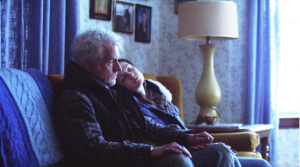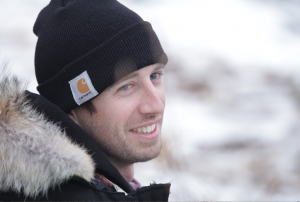 About 3 months ago we made the decision to self-distribute BLUEBIRD in North America. From the beginning, our goal was to make an intimate, quietly affecting ensemble drama. For writer/director Lance Edmands, there was a specific kind of feeling he was trying to express with the film. There was a unique sense of loneliness, solitude, and isolation that was linked directly to a region of Northern Maine and the culture that permeates the area. Lance grew up in Maine, and he felt that these melancholy emotions stood in stark contrast with the great rugged beauty of the state. We wanted to explore that conflicted feeling in way that would resonate personally with a viewer. It was important to us to maintain the subtle, quiet tone of the film both in the way we made it and the way we brought the film to an audience. With that in mind, we spent the last year considering various distribution offers and scenarios as we traveled with the film to festivals.
About 3 months ago we made the decision to self-distribute BLUEBIRD in North America. From the beginning, our goal was to make an intimate, quietly affecting ensemble drama. For writer/director Lance Edmands, there was a specific kind of feeling he was trying to express with the film. There was a unique sense of loneliness, solitude, and isolation that was linked directly to a region of Northern Maine and the culture that permeates the area. Lance grew up in Maine, and he felt that these melancholy emotions stood in stark contrast with the great rugged beauty of the state. We wanted to explore that conflicted feeling in way that would resonate personally with a viewer. It was important to us to maintain the subtle, quiet tone of the film both in the way we made it and the way we brought the film to an audience. With that in mind, we spent the last year considering various distribution offers and scenarios as we traveled with the film to festivals.
It was easy to concede that BLUEBIRD would probably perform like most independent films nowadays – the film would likely lose money on a theatrical, there would be little to no physical home video market, and our primary source of revenue would be digital. Conversations with distributors confirmed all of this. Nobody that we spoke with had the slightest interest in anything theatrical or physical. The conversations were solely about releasing the film digitally, so that’s where we focused the majority of our financial analysis.
Surprisingly, the financial structures skewed in favor of self-distribution (which is not necessarily to say that we would make more money if we self-distributed, just that the terms were better). As an example, we have the opportunity to license an exclusive 30-day window on a streaming digital platform for the same amount of money that some traditional distributors were offering for all of our rights for ten years (which says as much about the state of traditional distributors as it does about digital distribution). With Bluebird, we’re lucky enough to be able to partner with Sundance Artist’s Services. With their help, we can push the film out to all of the major digital retailers while still retaining the lion’s share of the revenue and retaining ownership of our rights. Partnering with an artist-friendly aggregator like Sundance Artist Services offered us an extra 5 – 25% on all of our digital revenue that otherwise would have gone to a distributor.
Knowing that, the real financial question became— does working with a traditional distributor increase the gross enough to offset our lower revenue share? In other words, will their experience, relationships, and expertise net us so much more money that the added distributor’s costs and distributor’s revenue share come out in the wash and we end up making more money? That felt hard to quantify, so we looked to their marketing plan for insight.
Invariably, all of the different distributors’ approaches focused on the celebrity aspect of the film – emphasize as many notable faces as possible on the poster, trailer, and iTunes thumbnail and hope that fans of those individuals are intrigued enough to watch BLUEBIRD. We could envision how that would be effective (after all, the cast is completely badass) but yet something about that approach felt false to us. It wasn’t so much that the marketing plan felt like it was misrepresenting what the film was, but rather, it was simply leaving a lot of the film out of the conversation all together – the tone, atmosphere, characters, plot, etc. It felt like we may as well have been selling an energy drink. It was around this time that something clicked for us. We concluded that, while working with a traditional distributor might actually gross enough money to offset our lower share of revenue, we might actually be sacrificing the spirit of the film in order to drum up that extra gross.
The financial component of BLUEBIRD has always been secondary for us. As artists, Lance and I both want to communicate through the medium of cinema. That was the goal and the challenge. I felt like my job as a Producer was to structure the process in a way that emphasized and showcased the spirit of the endeavor. That was the philosophy when we were casting the movie, when we were financing the movie, and when we were shooting and editing the movie. We realized that there was something about working with a traditional distributor that left us feeling like all of those goals and priorities for the film would be relegated. It was that feeling that prompted us to take self-distribution seriously.
If we could raise a modest amount of money to self-distribute the film, we could empower ourselves to maintain control over the process – which is not control in a superficial form. It’s not about having a logo at the front of the credits or having the final say over the poster or the trailer (although there are implications there), it’s about having control over what the focus of the process is going to be. It was about setting our own priorities and being able to work towards them.
I’m extremely proud of all of the hard work that everyone put into BLUEBIRD. There’s a holistic fragility to the film. For me it’s in the writing, the performances, the imagery, and it’s what the movie is about. I felt a responsibility and a desire to maintain that fragility for an audience. A big part of that is showing the film in movie theaters. Seeing a movie on the big screen is a unique, irreplaceable, cinematic experience. I’ve been to festivals and have witnessed the kinds of reactions audiences have to the film. I know that seeing this film in a theater makes a difference and I want to emphasize that with the release of the film. For us, that’s the payoff of years of hard work and an important and necessary part of the artistic process. We want to have the freedom to reach audiences in spite of the financial risks, and self-releasing allows us that opportunity. It’s our way of preserving and emphasizing the elements of the film that we hold close and, in that way, making the release an extension of the film’s spirit.
VISIT THE BLUEBIRD KICKSTARTER CAMPAIGN TO FIND OUT MORE ABOUT THE FILM AND TO SUPPORT ITS SELF RELEASE:
https://www.kickstarter.com/projects/bluebirdmovie/bluebird-the-film

His work includes THE GREAT INVISIBLE, directed by Margaret Brown and winner of the 2014 SXSW Film Festival Best Documentary award; TINY FURNITURE (IFC Films), written and directed by Lena Dunham, winner of the 2011 Independent Spirit Award for Best First Screenplay as well as Best Feature at the 2010 SXSW Film Festival; NY EXPORT: OPUS JAZZ, winner of the 2010 SXSW Film Festival Audience Award and produced in association with PBS and New York City Ballet dancers (PBS, BBC, Factory 25); Matt Wolf’s critically acclaimed and award winning WILD COMBINATION: A PORTRAIT OF ARTHUR RUSSELL (Sundance Channel, PlexiFilm); and BROCK ENRIGHT: GOOD TIMES WILL NEVER BE THE SAME (Factory 25). His latest film, Matt Wolf’s documentary TEENAGE, a stylized meditation on early 20th century youth cultures is in theaters and available digitally now. Writer/Director Lance Edmands’s BLUEBIRD is scheduled to be released theatrically this fall.





